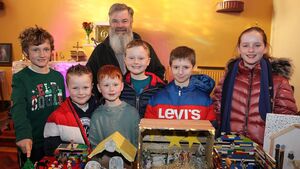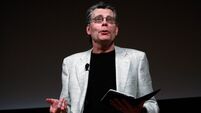We're all still searching for meaning in life

Local children with parish priest Fr Mike Murphy at Carras Church for the Festival of the Cribs of Roundfort Robeen Carras Parish. Picture: Trish Forde
For the first column of another new year, let’s take a subject of some importance: has religion a future? The doubters used to say that when science had explained all the mysteries of the world and when we were all millionaires, that we’d no longer need God. As adults of a brave new world, one day we’d look back on the naïve, unsophisticated and superstitious nonsense we called religion and wonder how we could have been so deluded.
Then we’d know that religion was the opium of the people. Then we’d know that God was dead.
But now unexpectedly religion and science are developing a mutual respect for their different perspectives. Now people with successful careers, good homes and living in comfortable circumstances, are beginning to ask, 'Is this all there is?' It prompts the question: Why is it that so many with so much want something more? In our brave new world, when every appetite can be satisfied and every need filled, why is the itch for something more still there?
It’s common now to meet people who have more money than they know what to do with, more material possessions than they ever dreamed about, more answers to questions that they thought could never be explained, and yet there’s something missing – some important constituent of life that they can’t get a handle on. They experience a hunger deep inside themselves that nothing seems to satisfy.
That’s not surprising because embedded in the human condition, in some shape or form, is a hunger for meaning, for spirituality, ultimately for God, that lurks just below the surface of life and that seeks, even sometimes demands, our attention.
The seventeenth-century philosopher and physicist, Blaise Pascal, wrote that in everyone there is an abyss that only God can fill. St Augustine wrote that our hearts are restless until they rest in God. There is an itch of restlessness that can only be satisfied when we experience a life-sustaining spirituality and a reflectiveness that helps us cope with the ups and downs of a lived life.
It's a common experience but while most of sense it, some take it very seriously. Like the man in his thirties – with a very successful career, plenty of material possessions and close friends – who has decided he wants to explore this ‘itch’ by entering a monastery. That, you might say, is the honours course.
The pass course might be represented by a friend of mine who told me some years ago that, as he grows older, he feels more and more the need to dig a bit deeper into his religious quest. He wanted an opportunity to reflect more, to pray more, to worship in ways that are personally satisfying to him. He found Mass on Sunday in his local church a rushed and frustrating experience. People were jammed into seats (it was some years ago!), there was no opportunity to savour any period of silence, the sermon seemed unprepared and unconvincing on a number of levels and everyone seemed to be – like hounds in a trap – waiting to get away. He was looking for something, he said, to fill a space in his life, a hunger in his heart that yearns for something more but he didn’t know where to find it.
Sometimes I sense that as numbers attending Mass decrease, as there is less pressure to conform and the disinterested and the uncommitted fall away, there’s a growing opportunity to explore in worship more deep-seated needs and more people will opt for alternative forms of religious engagement that they will experience as more satisfying.
I’ve written about this in more depth in my recent book, , in a chapter entitled ‘We need to talk about Sundays’ (pp. 117-117) and where I examine alternative forms of worship.
It could be that a small group of people, say less than 20, would gather one evening a week for a quiet and reflective meditation: scripture readings read slowly and with a shared reflection on their meanings; the sermon a group sharing on a particular theme; Bidding Prayers as individual responses to how the readings impinge on the lived experiences of the group; a lot of silent spaces for personal prayer; some gentle background music; and some muted lighting to create an aura of calm.
I have no doubt that there are thousands of people who would love that kind of intimate, personal liturgy that would provide a creative and satisfying space in the hectic lives we lead.
The good news is that such prayerful liturgies are already happening in parishes, as new lay ministries are opening up. In Killala diocese, 49 of the 65 lay-people who are in training for such leadership roles in a course in the Newman Institute (Ballina) received placements in six parishes – Ballina, Belmullet, Crossmolina, Enniscrone, Templeboy and Skreen & Dromard – and it is hoped to extend it to the other 16 parishes of the diocese in 2024.
As the number of priests continue to decline, lay-women and lay-men, with a particular interest, expertise and training in different forms of Prayer and Scripture, will be commissioned to lead a number of lay-led liturgies and forms of worship in the future. It is, as we say, the coming thing.
May I wish a happy new year to all my readers.
* Brendan Hoban’s new book, , is now available at €18 in the usual outlets and from www.mayobooks.ie.





